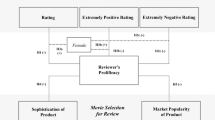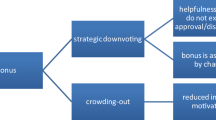Abstract
In recent years the internet has rapidly evolved from being a platform for companies to simply market their products or services into a platform where users can discuss the products or services among themselves. This increase in user-generated content has led to the creation of review websites, providing consumers with an opportunity to share their opinions on products or services and engage in electronic word-of-mouth (Henning-Thurau et al., 2004). Our modern society relies more and more on digital opinions (Muchnik et al., 2013) and consumers consult such online review websites frequently before making purchase decisions (Chevalier & Mayzlin, 2006). Thus, from a marketer’s perspective, online rating websites have become increasingly important based on their influence on product sales. However, reliability and accuracy of these reviews are often questioned, such that consumers are frequently unsure whether the overall rating of a product or service has not been influenced by fake reviews, written by employees of a company (Malbon, 2013). As a consequence, online rating websites may not always exactly reflect the product performance (Moe & Trusov, 2011). Hence, as online reviews play an important role in consumer decision making processes, it is also interesting to shed light on the accuracy of the reviews written by customers themselves. Before formulating their own experience and opinion of a product or service, customers are exposed to the opinions of other customers who have already written a review. Since it is not uncommon for humans to allow themselves to be influenced by others, former reviews may cause the writer of a new review to alter his opinion, possibly to adapt to or to stand out from previous opinions. This research offers an initial examination of the effects of social influence on individual rating behavior.
The results of two experimental studies focusing on hotel ratings (n = 105) and reviews for a digital camera (n = 168) confirm that individual online evaluations of products and services are indeed influenced by previously written reviews. More specifically, both experiments confirm that, in case of low satisfaction with product or service performance, reviewers are likely to incorporate previous reviews into their own evaluation which—if previous reviews were positive—marginally diminishes associated unfavorable ratings. In contrast, in high satisfaction situations reviewers are insensitive to social influence. Two main managerial implications may be derived from these findings. First, as previous negative reviews do not influence individual rating behavior if the customer’s satisfaction with a product or service is high, companies that satisfy the vast majority of their customer base do not have to fear the impact of sporadic negative reviews. Second, companies do not have to be afraid of exceptional dissatisfied customers, as positive previous reviews enhance follow-up reviews in case of dissatisfying experiences.
Access provided by Autonomous University of Puebla. Download conference paper PDF
Similar content being viewed by others
Keywords
These keywords were added by machine and not by the authors. This process is experimental and the keywords may be updated as the learning algorithm improves.
In recent years the internet has rapidly evolved from being a platform for companies to simply market their products or services into a platform where users can discuss the products or services among themselves. This increase in user-generated content has led to the creation of review websites, providing consumers with an opportunity to share their opinions on products or services and engage in electronic word-of-mouth (Henning-Thurau et al., 2004). Our modern society relies more and more on digital opinions (Muchnik et al., 2013) and consumers consult such online review websites frequently before making purchase decisions (Chevalier & Mayzlin, 2006). Thus, from a marketer’s perspective, online rating websites have become increasingly important based on their influence on product sales. However, reliability and accuracy of these reviews are often questioned, such that consumers are frequently unsure whether the overall rating of a product or service has not been influenced by fake reviews, written by employees of a company (Malbon, 2013). As a consequence, online rating websites may not always exactly reflect the product performance (Moe & Trusov, 2011). Hence, as online reviews play an important role in consumer decision making processes, it is also interesting to shed light on the accuracy of the reviews written by customers themselves. Before formulating their own experience and opinion of a product or service, customers are exposed to the opinions of other customers who have already written a review. Since it is not uncommon for humans to allow themselves to be influenced by others, former reviews may cause the writer of a new review to alter his opinion, possibly to adapt to or to stand out from previous opinions. This research offers an initial examination of the effects of social influence on individual rating behavior.
Author information
Authors and Affiliations
Corresponding author
Editor information
Editors and Affiliations
Rights and permissions
Copyright information
© 2016 The Academy of Marketing Science
About this paper
Cite this paper
Köcher, S., Paluch, S., Küsgen, S. (2016). The Recommendation Bias: The Effects of Social Influence on Individual Rating Behavior. In: Groza, M., Ragland, C. (eds) Marketing Challenges in a Turbulent Business Environment. Developments in Marketing Science: Proceedings of the Academy of Marketing Science. Springer, Cham. https://doi.org/10.1007/978-3-319-19428-8_93
Download citation
DOI: https://doi.org/10.1007/978-3-319-19428-8_93
Publisher Name: Springer, Cham
Print ISBN: 978-3-319-19427-1
Online ISBN: 978-3-319-19428-8
eBook Packages: Business and ManagementBusiness and Management (R0)




